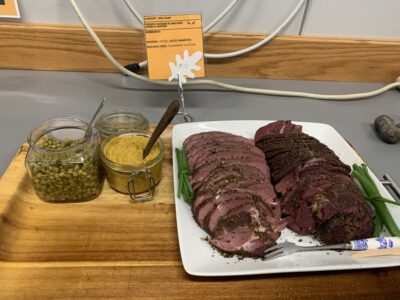Feds deny watchdog’s request for investigative report at Haskell; group says it’s ready to sue agency to get hundreds of documents

photo by: Journal-World File
A sign at the entrance to Haskell Indian Nations University is shown Friday, Aug. 5, 2016.
A government watchdog nonprofit is trying to obtain a report of an investigation into a number of alleged crimes on Haskell Indian Nations University’s campus, and it’s prepared to file a lawsuit to get the agency that oversees Haskell’s operations to stop withholding the document.
In late June, the Journal-World learned that Public Employees for Environmental Responsibility — a nonprofit agency that assists public employees in fighting for ethical management of natural resources, strong environmental laws, and accountability and transparency in government actions — filed a Freedom of Information Act request with the Bureau of Indian Education, the federal agency that oversees Haskell’s operations, earlier this year. That request was prompted by the Journal-World’s coverage of public demands from Haskell students to publicize a report of a six-month-long investigation that students claim took place on campus during 2022 and purportedly looked into allegations of sexual abuse, embezzlement and other wrongdoing.
That was in March, and PEER’s FOIA request was submitted about a month later on April 20. BIE FOIA Officer Justin Davis had responded to that request by May 25 — but only to let the nonprofit know the BIE would be withholding 528 pages worth of records related to the request in their entirety.
Jeff Ruch, who previously served as PEER’s executive director and is now the director of the agency’s Pacific regional office, submitted the FOIA request on behalf of the nonprofit. It’s unclear whether all 500-plus pages being withheld make up the whole investigation report or just part of it, but Ruch made it clear that either way it’s incredibly atypical for a federal agency to withhold an entire document rather than to just release a redacted version.
“The investigative report we’re looking for is the type of report that government agencies release all of the time,” Ruch told the Journal-World over the phone Monday afternoon. “The decision by the BIE to withhold the report in its entirety — every sentence, every word — is completely without merit. And the reasons they cited suggested that they were hoping to throw up enough smoke to make us go away.”
Those reasons, according to the BIE’s FOIA response letter, were based on three exemptions. The first reason is that some of the requested records are subject to the Indian Child Protection and Family Violence Prevention Act, which provides for the confidentiality of informants making reports of abused Native American children under one allowed exemption.
Another reason invokes “deliberative process privilege,” which is intended to protect the decision-making process of government agencies and encourage the frank exchange of ideas on legal or policy matters. The response letter claims that the materials being withheld under this exemption would have a “chilling effect on the agency’s deliberative processes” if disseminated publicly, thereby exposing the BIE’s decision-making process in a way that discourages candid discussion within the agency.
For its last reason, the BIE claims that the request doesn’t establish enough of a public interest to outweigh the privacy interests of the individuals whose personal information and other records would be included in the scope of the request. The Journal-World received a similar reason for the heavy redactions made to its own FOIA request concerning allegations of crimes on Haskell’s campus, which was submitted in May of 2022 but not fulfilled until nearly a year later on April 21, 2023.
But Ruch said he doesn’t buy any of those arguments as enough rationale to avoid releasing the documents altogether and characterized the BIE as “like a squid squirting ink.” That’s because PEER interacts with a number of federal agencies, not just the BIE, to facilitate FOIA requests on behalf of employees in something of a “safe” form of whistleblowing that doesn’t require the custodian of the document to come forward. He pushed back against each exemption the BIE cited in PEER’s appeal letter.
“We view this sort of work as an accountability exercise,” Ruch said. “Every year, we file probably about 50 to 75 requests, and we litigate about 15 to 20. And we typically litigate when an agency is (particularly stubborn in resisting control) or doesn’t respond to the FOIA within the statutory deadlines or, as in this instance, gives us a basis for withholding it that’s completely bogus.”
Litigation may be coming to this Haskell matter. Ruch said PEER is eligible to file suit in the next week — and fully intends to do so if need be. He said federal agencies are required to make a determination with respect to an appeal within 20 working days of its receipt. The appeal from PEER was submitted in writing on June 7; accounting for federal holidays like Juneteenth and Independence Day, the 20-day window expires after Friday, July 7. At that point, Ruch said PEER will have been “deemed to have exhausted its administrative remedies” and will be eligible to sue.
But that may not even be necessary, he said, because PEER also plans to contact the U.S. Department of the Interior’s Office of the Solicitor. The Department of the Interior oversees the BIE, and Ruch said in his experience, the Interior’s Solicitors Office has been good about responding to appeals and ordering agencies to turn over documents that were being withheld in an effort to avoid a costly legal process.
At any rate, Ruch said he thinks the BIE’s initial decision to withhold the document in its entirety indicates that any disfunction at Haskell isn’t just confined to its campus but extends to the BIE as an agency. He added that the first step to resolving problems on this scale is often to “ventilate” them, and government reports detailing sensitive topics and internal investigations are often released publicly as a matter of course. Just last year, the Department of the Interior released a federal study of Native American boarding schools that identified more than 500 student deaths at such institutions including Haskell, for example.
“It would be extraordinary to have a basis in which this sort of investigative report is withheld,” Ruch said. “…We’re expecting to get (the report) this month, one way or another.”
The Journal-World reached out to a press contact with the BIE for comment late Monday morning, who said the earliest the agency may be able to respond to questions about PEER’s FOIA request could be Wednesday.







